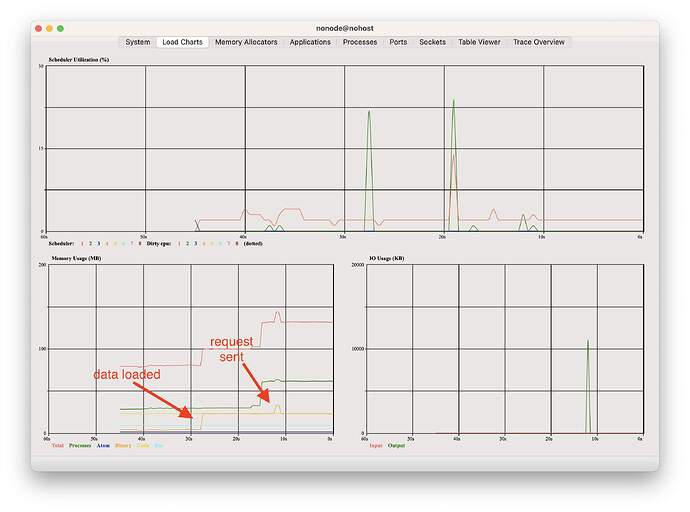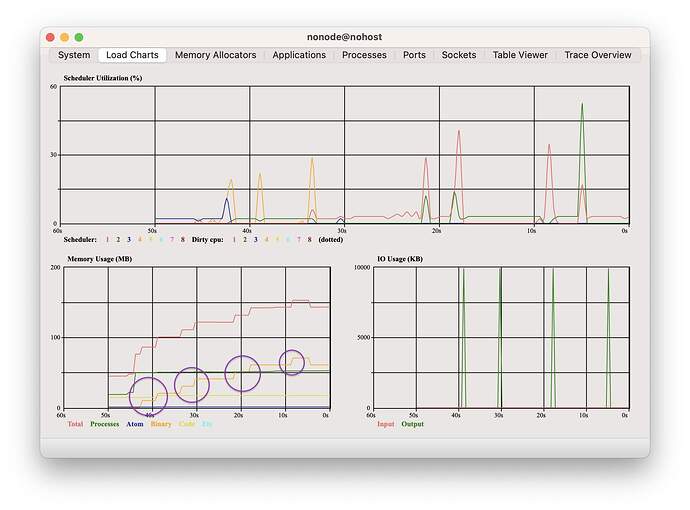I traced what Mint is doing and dropped down one level to :ssl and I consistently get the same results:
defmodule SslTest do
def run() do
host = "localhost"
port = 4040
method = "POST"
path = "/test/text"
content_length = 10 * 1024 * 1024
ssl_opts = [verify: :verify_none]
body = String.duplicate("-", content_length)
chunks = [body]
#chunks = chunk_binary(body, 1024 * 10)
IO.puts("waiting 3 seconds...")
Process.sleep(3000)
headers = [
{"host", "#{host}:#{port}"},
{"content-type", "text/plain"},
{"content-length", content_length}
]
{:ok, socket} =
:ssl.connect(
String.to_charlist(host),
port,
ssl_opts(host, ssl_opts)
)
request = [
"#{method} #{path} HTTP/1.1\r\n",
Enum.map(headers, fn {name, value} -> "#{name}: #{value}\r\n" end),
"\r\n"
]
:ok = :ssl.send(socket, request)
for chunk <- chunks do
:ok = :ssl.send(socket, chunk)
end
Process.sleep(500)
{:ok, response} = :ssl.recv(socket, 0, 0)
:ok = :ssl.close(socket)
IO.puts(response)
end
def ssl_opts(hostname, opts) do
[
server_name_indication: String.to_charlist(hostname),
versions: [:"tlsv1.3", :"tlsv1.2"],
depth: 4,
secure_renegotiate: true,
reuse_sessions: true,
packet: :raw,
mode: :binary,
active: false,
ciphers: [
%{cipher: :aes_256_gcm, key_exchange: :any, mac: :aead, prf: :sha384},
%{cipher: :aes_128_gcm, key_exchange: :any, mac: :aead, prf: :sha256},
%{cipher: :chacha20_poly1305, key_exchange: :any, mac: :aead, prf: :sha256},
%{cipher: :aes_128_ccm, key_exchange: :any, mac: :aead, prf: :sha256},
%{cipher: :aes_128_ccm_8, key_exchange: :any, mac: :aead, prf: :sha256},
%{
cipher: :aes_256_gcm,
key_exchange: :ecdhe_ecdsa,
mac: :aead,
prf: :sha384
},
%{cipher: :aes_256_gcm, key_exchange: :ecdhe_rsa, mac: :aead, prf: :sha384},
%{
cipher: :aes_256_ccm,
key_exchange: :ecdhe_ecdsa,
mac: :aead,
prf: :default_prf
},
%{
cipher: :aes_256_ccm_8,
key_exchange: :ecdhe_ecdsa,
mac: :aead,
prf: :default_prf
},
%{
cipher: :chacha20_poly1305,
key_exchange: :ecdhe_ecdsa,
mac: :aead,
prf: :sha256
},
%{
cipher: :chacha20_poly1305,
key_exchange: :ecdhe_rsa,
mac: :aead,
prf: :sha256
},
%{
cipher: :aes_128_gcm,
key_exchange: :ecdhe_ecdsa,
mac: :aead,
prf: :sha256
},
%{cipher: :aes_128_gcm, key_exchange: :ecdhe_rsa, mac: :aead, prf: :sha256},
%{
cipher: :aes_128_ccm,
key_exchange: :ecdhe_ecdsa,
mac: :aead,
prf: :default_prf
},
%{
cipher: :aes_128_ccm_8,
key_exchange: :ecdhe_ecdsa,
mac: :aead,
prf: :default_prf
},
%{cipher: :aes_256_gcm, key_exchange: :dhe_rsa, mac: :aead, prf: :sha384},
%{cipher: :aes_256_gcm, key_exchange: :dhe_dss, mac: :aead, prf: :sha384},
%{
cipher: :aes_256_cbc,
key_exchange: :dhe_rsa,
mac: :sha256,
prf: :default_prf
},
%{
cipher: :aes_256_cbc,
key_exchange: :dhe_dss,
mac: :sha256,
prf: :default_prf
},
%{cipher: :aes_128_gcm, key_exchange: :dhe_rsa, mac: :aead, prf: :sha256},
%{cipher: :aes_128_gcm, key_exchange: :dhe_dss, mac: :aead, prf: :sha256},
%{
cipher: :chacha20_poly1305,
key_exchange: :dhe_rsa,
mac: :aead,
prf: :sha256
},
%{
cipher: :aes_128_cbc,
key_exchange: :dhe_rsa,
mac: :sha256,
prf: :default_prf
},
%{
cipher: :aes_128_cbc,
key_exchange: :dhe_dss,
mac: :sha256,
prf: :default_prf
},
%{
cipher: :aes_256_cbc,
key_exchange: :ecdhe_ecdsa,
mac: :sha,
prf: :default_prf
},
%{
cipher: :aes_256_cbc,
key_exchange: :ecdhe_rsa,
mac: :sha,
prf: :default_prf
},
%{
cipher: :aes_256_cbc,
key_exchange: :ecdh_ecdsa,
mac: :sha,
prf: :default_prf
},
%{
cipher: :aes_256_cbc,
key_exchange: :ecdh_rsa,
mac: :sha,
prf: :default_prf
},
%{
cipher: :aes_128_cbc,
key_exchange: :ecdhe_ecdsa,
mac: :sha,
prf: :default_prf
},
%{
cipher: :aes_128_cbc,
key_exchange: :ecdhe_rsa,
mac: :sha,
prf: :default_prf
},
%{
cipher: :aes_128_cbc,
key_exchange: :ecdh_ecdsa,
mac: :sha,
prf: :default_prf
},
%{
cipher: :aes_128_cbc,
key_exchange: :ecdh_rsa,
mac: :sha,
prf: :default_prf
},
%{
cipher: :aes_256_cbc,
key_exchange: :dhe_rsa,
mac: :sha,
prf: :default_prf
},
%{
cipher: :aes_256_cbc,
key_exchange: :dhe_dss,
mac: :sha,
prf: :default_prf
},
%{
cipher: :aes_128_cbc,
key_exchange: :dhe_rsa,
mac: :sha,
prf: :default_prf
},
%{
cipher: :aes_128_cbc,
key_exchange: :dhe_dss,
mac: :sha,
prf: :default_prf
},
%{
cipher: :aes_128_cbc,
key_exchange: :rsa_psk,
mac: :sha256,
prf: :default_prf
},
%{
cipher: :aes_256_cbc,
key_exchange: :rsa_psk,
mac: :sha,
prf: :default_prf
},
%{
cipher: :aes_128_cbc,
key_exchange: :rsa_psk,
mac: :sha,
prf: :default_prf
},
%{cipher: :rc4_128, key_exchange: :rsa_psk, mac: :sha, prf: :default_prf},
%{
cipher: :aes_256_cbc,
key_exchange: :srp_rsa,
mac: :sha,
prf: :default_prf
},
%{
cipher: :aes_256_cbc,
key_exchange: :srp_dss,
mac: :sha,
prf: :default_prf
},
%{
cipher: :aes_128_cbc,
key_exchange: :srp_rsa,
mac: :sha,
prf: :default_prf
},
%{
cipher: :aes_128_cbc,
key_exchange: :srp_dss,
mac: :sha,
prf: :default_prf
},
%{cipher: :aes_256_cbc, key_exchange: :rsa, mac: :sha256, prf: :default_prf},
%{cipher: :aes_128_cbc, key_exchange: :rsa, mac: :sha256, prf: :default_prf},
%{cipher: :aes_256_cbc, key_exchange: :rsa, mac: :sha, prf: :default_prf},
%{cipher: :aes_128_cbc, key_exchange: :rsa, mac: :sha, prf: :default_prf},
%{cipher: :"3des_ede_cbc", key_exchange: :rsa, mac: :sha, prf: :default_prf},
%{
cipher: :"3des_ede_cbc",
key_exchange: :ecdhe_ecdsa,
mac: :sha,
prf: :default_prf
},
%{
cipher: :"3des_ede_cbc",
key_exchange: :ecdhe_rsa,
mac: :sha,
prf: :default_prf
},
%{
cipher: :"3des_ede_cbc",
key_exchange: :dhe_rsa,
mac: :sha,
prf: :default_prf
},
%{
cipher: :"3des_ede_cbc",
key_exchange: :dhe_dss,
mac: :sha,
prf: :default_prf
},
%{
cipher: :"3des_ede_cbc",
key_exchange: :ecdh_ecdsa,
mac: :sha,
prf: :default_prf
},
%{
cipher: :"3des_ede_cbc",
key_exchange: :ecdh_rsa,
mac: :sha,
prf: :default_prf
},
%{cipher: :des_cbc, key_exchange: :dhe_rsa, mac: :sha, prf: :default_prf},
%{cipher: :des_cbc, key_exchange: :rsa, mac: :sha, prf: :default_prf},
%{
cipher: :rc4_128,
key_exchange: :ecdhe_ecdsa,
mac: :sha,
prf: :default_prf
},
%{cipher: :rc4_128, key_exchange: :ecdhe_rsa, mac: :sha, prf: :default_prf},
%{cipher: :rc4_128, key_exchange: :ecdh_ecdsa, mac: :sha, prf: :default_prf},
%{cipher: :rc4_128, key_exchange: :ecdh_rsa, mac: :sha, prf: :default_prf},
%{cipher: :rc4_128, key_exchange: :rsa, mac: :sha, prf: :default_prf},
%{cipher: :rc4_128, key_exchange: :rsa, mac: :md5, prf: :default_prf}
]
]
|> Keyword.merge(opts)
end
def chunk_binary(str, size \\ 102_400, acc \\ []) do
case String.split_at(str, size) do
{slice, ""} -> Enum.reverse([slice | acc])
{slice, rest} -> chunk_binary(rest, size, [slice | acc])
end
end
end
If you uncomment the line with the call to chunk_binary the memory spike disappears.
























